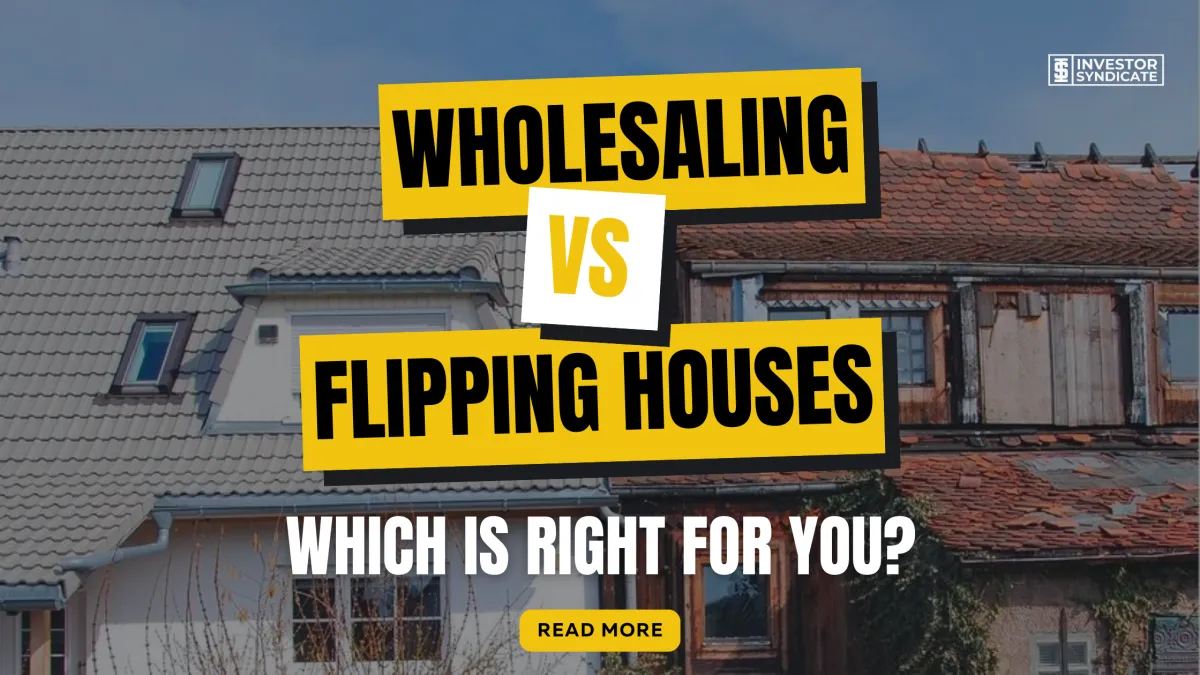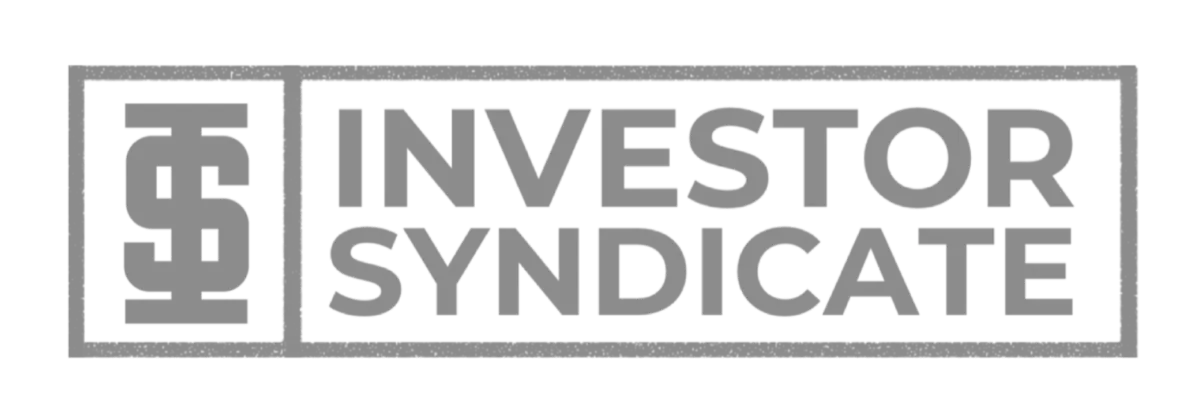Investor Syndicate Blogs
Download The Deal Flipping Playbook

Wholesaling Vs Flipping Houses Which Is Right For You?
Introduction
Two popular strategies often take center stage: wholesaling and house flipping. Both approaches offer unique opportunities and challenges, catering to different investor preferences and goals. But how do you determine which path is right for you? In this article, we delve into the intricacies of wholesaling and flipping houses, helping you make an informed decision tailored to your real estate aspirations.

Wholesaling Houses: The Art of Deal-Making
Flipping Houses: The Art of Transformation
Wholesaling Houses: The Art of Deal-Making
Wholesaling houses is a dynamic real estate strategy that centers on the art of deal-making. As a wholesaler, your role is akin to that of a real estate matchmaker. You identify properties with potential, negotiate favorable terms with motivated sellers, and then connect these opportunities with investors seeking promising deals. This intermediary role requires a keen eye for distressed properties, strong negotiation skills, and a well-established network of cash buyers.
One of the defining features of wholesaling is its accessibility. With relatively low capital requirements and a straightforward transaction process, it's an ideal entry point for budding real estate investors. Wholesalers operate in the realm of speed and efficiency, aiming to secure contracts swiftly and, in turn, generate income through assignment or double-closing deals.
While wholesaling may yield lower profit margins per deal compared to house flipping, its appeal lies in its reduced risk and a quicker turnaround. It's a strategy that rewards those who excel in the art of identifying opportunities and facilitating win-win transactions in the ever-evolving real estate market.
The Basics
Wholesaling houses involves acting as a middleman in real estate transactions. As a wholesaler, your primary role is to identify distressed properties, negotiate favorable purchase prices, and then assign or sell the contracts to other investors for a fee. It's essentially a play on finding and facilitating deals rather than owning and renovating properties.
Pros of Wholesaling
Low Capital Requirement: Wholesaling typically requires minimal upfront capital, making it an accessible option for novice investors.
Reduced Risk: Since you don't own the property, your exposure to potential losses is limited.
Quick Turnaround: Wholesaling deals can be executed swiftly, allowing for a faster return on investment.
Cons of Wholesaling
Lower Profit Margins: While wholesaling can generate income, the profits per deal are generally lower compared to flipping.
Market Dependency: Success in wholesaling relies heavily on finding motivated sellers and a robust network of cash buyers.
Flipping Houses: The Art of Transformation
Flipping houses is a captivating venture that revolves around the art of transformation in real estate. This strategy entails acquiring distressed or undervalued properties, investing in strategic renovations and upgrades, and ultimately selling them for a profit. At its core, flipping houses is akin to breathing new life into a property, and it's a domain where creativity and vision merge with sound financial decisions.
A successful house flipper is more than just a buyer and seller; they are transformational artists. They possess the ability to see the hidden potential in a property, envision its future appeal, and orchestrate the necessary changes to unlock its value. This process involves careful planning, budget management, and a keen understanding of market trends.
While the world of house flipping is renowned for its profit potential, it's not without its challenges. Flippers must navigate through various aspects, including property selection, financing, construction, and market timing, all while managing risks and ensuring a profitable outcome. In this realm, the artistry lies in balancing creative vision with financial acumen, ultimately turning neglected houses into desirable homes and, in the process, securing a rewarding return on investment.
The Basics
House flipping is a hands-on approach to real estate investment. It entails purchasing distressed properties, renovating or upgrading them, and then selling them at a higher price, ideally turning a profit. Successful house flipping requires a combination of market analysis, property management, and renovation skills.
Pros of House Flipping
Profit Potential: House flipping offers substantial profit margins, especially if you can increase a property's value significantly.
Property Ownership: You have control over the property's design and renovation, allowing you to tailor it to market demands.
Long-Term Investment: Flipped properties can serve as long-term assets, providing rental income or appreciation over time.
Cons of House Flipping
High Capital Investment: House flipping demands a substantial upfront investment for property purchase and renovations.
Risk of Loss: Market fluctuations and unexpected renovation costs can lead to financial losses.
Time-Intensive: Renovations and property management can be time-consuming, potentially affecting your overall return on investment.
Which Path Is Right For You?
As you explore the realms of real estate investment, the question that often looms large is, "Which path is right for you?" Both wholesaling and flipping houses are compelling avenues, each with its unique merits and considerations.
Wholesaling real estate, often referred to as the "gateway" to real estate investing, appeals to those who prefer a low-risk, low-capital entry point. It involves connecting motivated sellers with interested buyers, acting as an intermediary in the transaction. Wholesalers rely on their negotiation skills, market knowledge, and a robust network to facilitate deals without directly owning the properties. It's an excellent choice for those looking to start quickly with minimal investment and can thrive in a fast-paced, relationship-driven environment.
On the other hand, flipping houses offers a more hands-on approach, appealing to the creative and entrepreneurial spirit. This strategy requires a deeper commitment of time and capital. Flippers actively purchase properties, oversee renovations, and sell them for a profit. It demands a keen eye for property potential, strong financial planning, and project management skills. Flipping can yield substantial returns but carries higher risks and responsibilities.
Ultimately, the choice between wholesaling and flipping hinges on your risk tolerance, financial capacity, and personal preferences. Some investors may find success in one path, while others may opt for a combination of both. Understanding your goals, resources, and inclination will help you determine the right path to navigate the dynamic landscape of real estate investment successfully.
The decision between wholesaling and house flipping ultimately hinges on your financial situation, risk tolerance, and investment goals. Here are some key considerations to help you determine which strategy aligns better with your aspirations:
Financial Resources:
When contemplating a venture into real estate wholesaling or house flipping, your financial resources play a pivotal role in shaping your path. Both avenues require capital, but the extent and timing of financial commitments differ significantly.
In wholesaling, the initial financial outlay is relatively modest. As a wholesaler, you won't be purchasing properties, which means you won't need substantial funds for property acquisition or renovations. However, you should allocate resources for marketing, building a network, and covering operational expenses. Wholesalers often benefit from low upfront costs, making it accessible for those with limited financial resources.
On the contrary, house flipping demands a more significant financial commitment upfront. You'll need capital not only to purchase properties but also for renovation costs, holding expenses, and potential unexpected challenges. Adequate financial resources are critical for securing loans, covering carrying costs, and managing contingencies, ensuring your house flipping project progresses smoothly.
Before choosing your path, assess your financial situation carefully. Consider your access to capital, risk tolerance, and long-term financial goals. Whether you're well-capitalized for house flipping or prefer the lower financial barrier of wholesaling, aligning your resources with your chosen strategy is essential for a successful real estate investment journey.
If you have limited capital and want to dip your toes into real estate, wholesaling is a low-risk entry point. Conversely, if you have substantial funds and are looking for higher returns, house flipping offers greater profit potential.
Risk Tolerance:
Wholesaling involves lower risk since you're not investing large sums in property purchases and renovations. House flipping, on the other hand, carries higher financial risks due to the upfront investment and market uncertainties.
Wholesaling generally presents lower risks compared to house flipping. As a wholesaler, you're primarily engaged in the negotiation and assignment of contracts without owning the properties. While this minimizes exposure to renovation expenses and market fluctuations, it doesn't eliminate risks entirely. Your risk tolerance should account for factors like market volatility, contractual obligations, and the possibility of deals falling through.
Conversely, house flipping often involves higher risks. It requires a substantial financial commitment, exposure to market fluctuations, and the complexities of property renovations. Your risk tolerance should encompass the capacity to manage unexpected costs, market downturns, and project delays.
Evaluating your risk tolerance is a critical step in deciding which path – wholesaling or house flipping – aligns with your investment goals and comfort level. By understanding your risk tolerance, you can embark on a real estate journey that suits your financial and emotional readiness for the challenges and opportunities ahead.
Time Commitment:
Wholesaling can be executed relatively quickly, making it suitable for those with limited time availability. House flipping requires more time, especially if you're directly involved in renovations and property management.
understanding the implications of time commitment is pivotal when choosing between wholesaling and house flipping. These two investment strategies require significantly different levels of involvement and dedication.
Wholesaling, often considered the more time-efficient option, involves identifying potential deals, negotiating contracts, and connecting sellers with buyers. While it demands diligence, wholesaling typically requires fewer hours compared to house flipping. This makes it an attractive choice for those with limited time resources, such as individuals with full-time jobs or other commitments.
On the other hand, house flipping is a more time-intensive endeavor. It encompasses property acquisition, renovation, and the eventual sale. House flippers often find themselves deeply involved in project management, overseeing contractors, and dealing with unexpected challenges. This demands a substantial time commitment, making it suitable for those who can dedicate significant hours to the venture.
Assessing your available time and willingness to commit is essential in making the right choice. Wholesaling offers flexibility, while house flipping requires a more hands-on approach. Your decision should align with your lifestyle, ensuring that your real estate journey is both fulfilling and manageable.
Skill Set:
Consider your skills and expertise. House flipping demands knowledge of property renovation, market trends, and property management. Wholesaling relies more on negotiation and deal-finding abilities.
When deciding between wholesaling and house flipping, a critical factor to consider is your skill set. Both real estate investment strategies demand distinct abilities and proficiencies. Wholesaling primarily relies on negotiation skills, market analysis, and networking.
Wholesalers excel at identifying lucrative deals, building relationships with both sellers and buyers, and negotiating favorable terms. Effective communication and a deep understanding of the local real estate market are key assets for a successful wholesaler.
Conversely, house flipping involves a broader skill set. Flippers need to be well-versed in property assessment, renovation management, and financial analysis. They should have a knack for identifying properties with renovation potential, coordinating construction or renovation work, and managing budgets effectively. Attention to detail, project management skills, and a creative eye for design are invaluable in the house flipping process.
Your choice between wholesaling and house flipping should align with your existing skills and your willingness to acquire new ones. While wholesaling may suit those with strong negotiation and networking abilities, house flipping may be a better fit for individuals with a background in construction, design, or project management. Assessing your skill set is essential to embark on a real estate venture that capitalizes on your strengths.
In conclusion, both wholesaling and house flipping have their merits, and the right choice depends on your unique circumstances and goals. Some investors even combine both strategies in their real estate portfolios. Understanding your financial capacity, risk tolerance, and skill set is essential in making an informed decision that aligns with your real estate investment journey. Whether you choose wholesaling or house flipping, the key to success lies in diligence, market research, and a commitment to learning and adapting to the ever-changing real estate landscape.
Contact Us

Bet On Yourself
Empowering real estate investors with the tools they need to scale.






